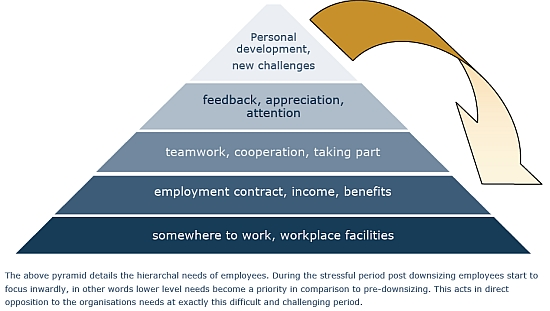Survival syndrome

Today’s economy has undoubtedly had an impact upon employee attitudes. Not all organisations have had to face downsizing, but for those that have, it is often the case that those remaining in employement undergo a range of attitudinal changes which directly impact performance.
The term ‘survival syndrome’ is used to describe the impact on the attitudes and resulting behaviors of employees who remain in organisations where reductions in the workforce have recently occurred.
It refers to the psychological response to a combination of job cuts and high associated stress – stress which differs from ‘normal’ stress in that it is the result of events beyond the organisation or its employees’ ability to control.
It affects a wider percentage of the workforce than more common work-related stress and it lasts longer, particularly in environments where it is reinforced by additional cuts.
Unsurprisingly, employees become preoccupied with their future security and informal communications are dominated by the subject matter. Put another way, employees turn their focus inwardly and devote far less energy to organisational performance at just the time their workloads often increase and their efforts are required more than at other times.
Survival syndrome left unchecked and/or unmanaged results in significant unwanted financial and human cost to the organisation. A survival syndrome survey offers a clear insight into the areas, unit by unit, that must be addressed to minimise inadvertent performance reductions.
Whitepaper: 7 Tips for your employee survey
Download this whitepaper and receive 7 tips to think about before starting your next employee survey, as well as tricks to avoid common pitfalls.
Download